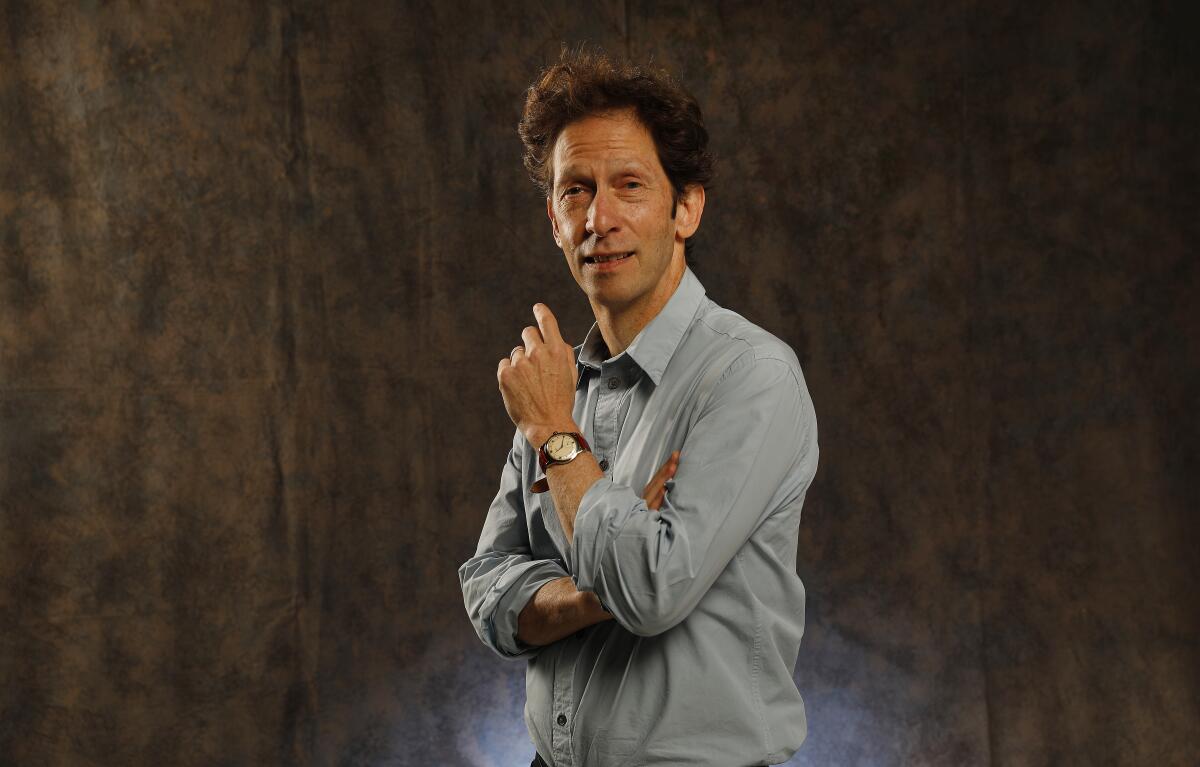Tim Blake Nelson goes inside the fear to play a perjuring convict in ‘Just Mercy’

- Share via
At 55, Tim Blake Nelson has stopped thinking about the size of a role. What he’s interested in is managing time. “I’ve started to find that I spend more time now preparing for characters right than I do [in the making of the film],” says Nelson, who prefers to occupy his pre-filming days learning such things as how to do a headstand (“The True Don Quixote”) or twirl pistols (“The Ballad of Buster Scruggs”).
For his searingly memorable performance as perjuring convict Ralph Myers in the Christmas Day legal drama “Just Mercy,” he knew he needed to spend time with a makeup artist figuring out how his character — a facially disfigured burn victim with a drooping mouth — would look. Recently, Nelson could be found in a hotel dining room sipping on a four-shot espresso and talking about his trio of fall roles: Ralph, his vital part in “The Report” and Looking Glass on HBO’s “Watchmen.”
You’ve described Ralph Myers as “an avatar for poor white America.” Explain.
I had a very comfortable upbringing [in Tulsa, Okla.]. But inside of that I had plenty of exposure to those who weren’t as advantaged. What the white power structure in America does is to turn the less fortunate of its own racial component against anyone outside of that component who seems like they’re a threat to white power. If you combine the defense and pursuit of power with America’s original sin — slavery — you really have a bad combination. Poor whites are effectively exploited in that dynamic.
You’ve said that you’re at a stage where you only want to play irresistible characters. What’s irresistible about Ralph?
I loved the script and what it was pursuing spiritually and narratively. I already knew about Bryan Stevenson [the real-life attorney the film is based on]. I’d heard about him on NPR. Then inside of that, there was this wildly challenging character who had issues, constraints and trauma that I’d never encountered before. Certainly not in my own life and not as an actor, either. All that adds up to irresistible.
One way you prepped for the role was by watching a long interview with Ralph Myers.
Over and over and over and over.
What did you learn?
This is a guy who’s motivated by terror that emanates from when he was a little boy getting burned in a fire and there’s no one there to help him out. All of his dissembling and wiliness seemed to come from that. As a character actor, your job is [to ask yourself], “Where do I fit into the main story? What choices can I make that most animate and humanize the points of inflection on the main character that involve my character?”
When you made “The Report,” did you know it would be so timely?
It didn’t surprise me, because [writer-director] Scott Z. Burns is such a smart and prescient thinker, as are his producers Jennifer Fox and Stephen Soderbergh. They’re people who make movies because they read the paper and understand what’s up in the world. Talk about “irresistible.” I want to be in the room with those people. In this case, that meant a four- or five-scene role.
How did growing up with an activist mother affect the type of films you make?
There’s nothing that I do, for better or worse, where I don’t think, “What’s my mother going to think?” She’s probably the most moral person I know in terms of having a code and living by it. She was a rigorously judgmental parent in terms of promoting that code. My siblings and I grew up in a house in which there were clear rights and wrongs. There was an absence of the relativism that seems to pervade my own parenting. [laughs]
Were you a TV-watching kid?
Television was reviled in our house growing up. It’s taken me a while to understand that the television of today is not what that television was, that there can be shows like “Watchmen” or “Warm Springs,” shows that actually have something to say and an openness across all strata of culture that allow them to be impactful in positive ways.
Talk about your “Watchmen” character Looking Glass’ reflective silver mask. What’s it like to act wearing something that hides all your expressions?
He wants to give away as little about himself as possible. Concealment in this universe is empowering. I was finding that once I put the mask on, the character became more still in terms of movement, more restrained in terms of vocal exposure. That’s a very long answer. I could have just said, “It’s been a great challenge to be hobbled in that way, and I think it’s making me and all of us who are in the show into better actors.”
More to Read
Only good movies
Get the Indie Focus newsletter, Mark Olsen's weekly guide to the world of cinema.
You may occasionally receive promotional content from the Los Angeles Times.










